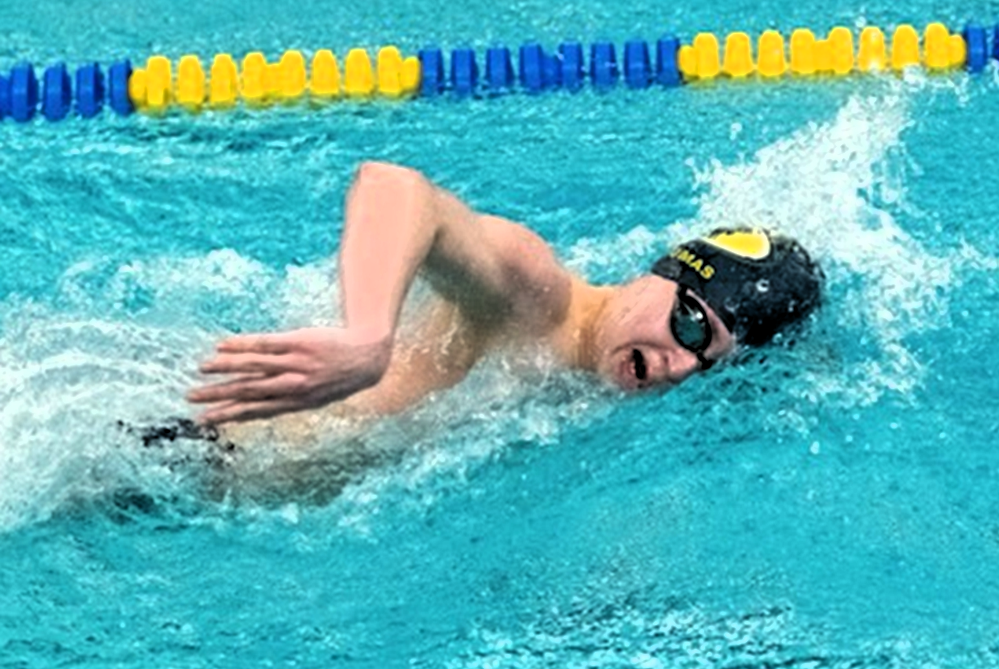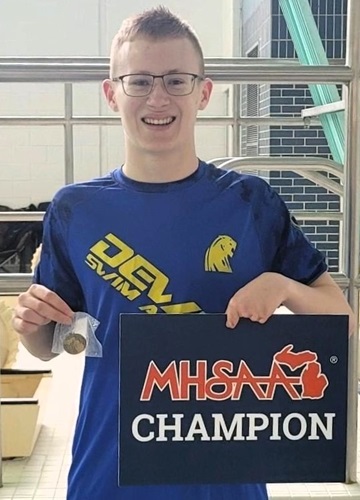
- Boys Swim & Dive
- Wrestling
- Girls Swim & Dive
- Competitive Cheer
- Girls Bowling
- Girls Skiing
- Boys Skiing
- Girls Basketball
- Boys Basketball
- Boys Bowling
- Gymnastics
- Ice Hockey
- MHSAA News
MHSAA Winter Sports Start with Extended Basketball Schedules, New Wrestling Weights
By
Geoff Kimmerly
MHSAA.com senior editor
December 13, 2022
The addition of two games to basketball regular-season schedules and a new series of wrestling weight classes are likely the most noticeable Winter 2022-23 changes as an estimated 65,000 athletes statewide take part in 13 sports for which the Michigan High School Athletic Association sponsors postseason tournaments.
Girls gymnastics and boys ice hockey teams were able to begin practice Oct. 31, with the rest of those sports beginning in November – including also girls and boys basketball, girls and boys bowling, girls competitive cheer, girls and boys skiing, Upper Peninsula girls and boys and Lower Peninsula boys swimming & diving, and girls and boys wrestling.
A variety of changes are in effect for winter sports this season, including a several that will be noteworthy and noticeable to teams and spectators alike.
Basketball remains the most-participated winter sport for MHSAA member schools with 33,000 athletes taking part last season, and for the first time, basketball teams may play up to 22 regular-season games. This increase from the previous 20-game schedule allows more games for teams at every high school level – varsity, junior varsity and freshman.
Another significant change has been made in wrestling, as the majority of boys wrestling weight classes have been adjusted for this season in anticipation of a national change coming in 2023-24. The updated boys weight classes are 106, 113, 120, 126, 132, 138, 144, 150, 157, 165, 175, 190, 215 and 285 pounds. Only 215 and 285 remain from the previous lineup. There is also one change to girls weight classes, with the 255 class replaced by 235 to also align with national high school standards.
A series of notable changes will affect how competition takes place at the MHSAA Tournament levels. In hockey, in addition to a new classification process that spread cooperative and single-school programs evenly throughout the three playoff divisions, the MHSAA Tournament will employ two changes. The Michigan Power Ratings (MPR) will be used to seed the entire Regional round, not just the top two teams, and prior to the start of Semifinals, a seeding committee will reseed the remaining four teams in each division with the top seed in each then facing the No. 4 seed, and the No. 2 seed facing No. 3.
Bowling also will see an MHSAA Tournament change, as the Team Regional format will mirror the long-standing Team Final with teams playing eight Baker games and two regular games at both levels. And as also applied during the fall girls season, there is a new qualification process for divers seeking to advance to Lower Peninsula Boys Swimming & Diving Finals. In each of the three divisions, each Regional will be guaranteed 10 qualifiers for the Finals, with six more “floating” qualifier entries to be distributed to the Regionals that have one of the previous year’s top six returning Finals divers in their fields. If a team changes division from the previous season, any floating top-six spots are added to the six already allowed in the school’s new division.
A gymnastics rules change provides an opportunity for additional scoring during the floor exercise. A dance passage requirement was added in place of the former dance series requirement to encourage creativity and a more artistic use of dance. The dance passage requires gymnasts to include two Group 1 elements – one a leap with legs in cross or side split position, the other a superior element.
In competitive cheer, the penalty for going over the time limit in each round was adjusted to one penalty point for every second over the time limit, not to exceed 15 points. The new time limit rule is more lenient than the past penalty, which subtracted points based on ranges of time over the limit.
The 2022-23 Winter campaign culminates with postseason tournaments, as the championship schedule begins with the Upper Peninsula Girls & Boys Swimming & Diving Finals on Feb. 18 and wraps up with the Boys Basketball Finals on March 25. Here is a complete list of winter tournament dates:
Boys Basketball
Districts – March 6, 8, 10
Regionals – March 13, 15
Quarterfinals – March 21
Semifinals – March 23-24
Finals – March 25
Girls Basketball
Districts – Feb. 27, March 1, 3
Regionals – March 7, 9
Quarterfinals – March 14
Semifinals – March 16-17
Finals – March 18
Bowling
Regionals – Feb. 24-25
Finals – March 3-4
Competitive Cheer
District – Feb. 17-18
Regionals – Feb. 25
Finals – March 2-3
Gymnastics
Regionals – March 4
Finals – March 10-11
Ice Hockey
Regionals – Feb. 20-March 1
Quarterfinals – March 4
Semifinals – March 9-10
Finals – March 11
Skiing
Regionals – Feb. 13-17
Finals – Feb. 27
Swimming & Diving
Upper Peninsula Girls/Boys Finals – Feb. 18
Lower Peninsula Boys Diving Regionals – March 2
Lower Peninsula Boys Finals – March 10-11
Wrestling – Team
Districts – Feb. 8-9
Regionals – Feb. 15
Finals – Feb. 24-25
Wrestling – Individual
Districts – Feb. 11
Regionals – Feb. 18
Finals – March 3-4
The MHSAA is a private, not-for-profit corporation of voluntary membership by more than 1,500 public and private senior high schools and junior high/middle schools which exists to develop common rules for athletic eligibility and competition. No government funds or tax dollars support the MHSAA, which was the first such association nationally to not accept membership dues or tournament entry fees from schools. Member schools which enforce these rules are permitted to participate in MHSAA tournaments, which attract more than 1.3 million spectators each year.

DeWitt's Thomas Blazes Swimming Path with Historic Finals Performance
By
Steve Vedder
Special for MHSAA.com
April 4, 2024
Aaron Thomas easily could have decided that swimming wasn't going to be part of his life.
 The DeWitt senior could've pieced together some combination of his other entertainment interests to fill his time. For instance, he could have spent more time with friends or immersed himself in video games. Or maybe devoted more time to a flirtation with golf or playing trumpet in the school band. Thomas also could have gained a head start on college and his ultimate goal of a degree in biomedical engineering.
The DeWitt senior could've pieced together some combination of his other entertainment interests to fill his time. For instance, he could have spent more time with friends or immersed himself in video games. Or maybe devoted more time to a flirtation with golf or playing trumpet in the school band. Thomas also could have gained a head start on college and his ultimate goal of a degree in biomedical engineering.
Considering the lifetime of challenges he's faced in swimming, those seemed more tenable options.
Instead, Thomas chose the tougher path.
"My life is swimming," he said. "I've been in water so much, I've never looked back."
By "looking back," Thomas means ignoring a disability that would have turned many youngsters away from the pool. He was born without 65 percent of his pointer finger on his left hand and with a thumb that's only about 90-percent intact. The other three fingers stop at the top of the knuckle. As DeWitt coach Brock Delaney explains, much of a swimmer’s success comes from the power of fingers and subsequent strength in the hands – and without that combination, swimmers are at an immediate disadvantage.
But rather than letting those obstacles keep him high and dry, Thomas has excelled and finished this season with a historic first. He qualified for the Lower Peninsula Division 3 Finals in the 200-yard individual medley and finished 29th and also competed in the Paralympic 100 freestyle exhibition event and topped all divisions with a time of 54.07 seconds. In doing so, Thomas became the first competitor to swim that combination at a Finals meet.
Thomas additionally this winter made DeWitt's Century Club of swimmers who have amassed 100 points in a season for the second time, and he has earned National Interscholastic Swim Coaches Association (NISCA) Paralympic All-American honors in the 200-yard freestyle (1:56.64), 200 IM (2:08.21), and 500 free (5:11.58). He also competes in Paralympic swimming as part of the Mid-Michigan Aquatics Club.
To some, the quest for those achievements likely would seem a long and difficult path. But to Thomas, it's business as usual. A disability? What disability, offers Thomas, whose ultimate goal is swimming in the 2028 Summer Paralympics in Los Angeles.
"I've always loved swimming," he said. "When I'm in the water, I never worry about anything. I just feel free."
 And Thomas has found a way to even the playing field, Delaney said.
And Thomas has found a way to even the playing field, Delaney said.
"He's such a hard worker who has made up for a left-hand deficiency," Delaney said. "He's legit, a strong kid who loves to swim. "
But determination can take a swimmer only so far. Delaney said Thomas, classified as an S10 swimmer for Paralympic events, has developed physical strategies to increase his performance. In the backstroke, for instance, Thomas swims with his left hand underwater to help in propulsion. For speed, Thomas tries to keep his body on his "power side."
The rest, Delaney said, is simply heart.
"He moved here from Alma between his eighth grade and freshmen years," he said. "If not our hardest worker, he's in the top three. He's got something not all athletes have."
Thomas said one of the chief reasons he spends so much time around pools is the type of person he finds there. He describes people who combine encouragement and understanding with a will to compete despite any perceived physical shortcomings. What he's learned from them not only explains his swim career, but teaches valuable life lessons as well.
In fact, Thomas' career plans, beginning at Hope College in the fall, include securing a degree in biomedical engineering with an ultimate plan to help build prosthetics.
"Getting to know people in the prosthetic field really interests me," he said. "Swimming and prosthetics have been a nice tie-in with school. Prosthetics ties it all together for me."
Thomas said he can think of only a single instance where he questioned whether he should follow his love of swimming. But that thought quickly passed, and he's thrown himself into the sport ever since.
"I wouldn't trade my disability for the world," he said. "It's given me so many opportunities. The whole club and school thing and getting to the state meet never would have happened.”
Thomas will swim at Hope, and his goal is to qualify for the 200 IM at the Los Angeles Paralympic games. Thomas estimates he's within 15 seconds of qualifying in that meet's long course event.
"It's achievable," he said. "For sure it's doable."
Whether he makes it to Los Angeles or if his swim career quietly winds down, Thomas, who describes himself as competitive, said he still will have gained something for which everyone strives, athlete or not.
"Water has always been a safe spot for me," he said. "I think I've always used it as kind of a break from life. It helps clear my head.
“I've always been taught that you get out of work what you put into it. Work always pays off in the end. I've always remembered that.”
PHOTOS (Top) Aaron Thomas races for the DeWitt swimming & diving team. (Middle) Thomas posted the fastest time across all divisions in the Paralympic 100 freestyle exhibition at this season’s Finals. (Photos provided by the DeWitt swimming & diving program and Thomas family.)

